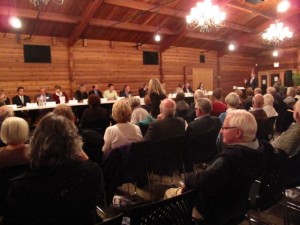Posts Tagged ‘BCSTA’
Who Will Fight For Public Education?
On December 6, Peter Fassbender, the provincial Minister of Education, spoke at the BC School Trustees Association (BCSTA) Academy. It was the first time I had heard him in-person and I found his presentation to be coercive, if not threatening. His central argument seemed to be that in these uncertain economic times Boards of Education must make hard decisions or else face the consequences. I’m still trying to decipher his meaning.
Afterwards, in one of those characteristic quick chats you have at events such as these, another Trustee said to me she felt Minister Fassbender sounded more like the Minister for Small Business and Trade than the Minister of Education. Then she said this: “If you can’t count on the Minister of Education, then who can you count on? Who will fight for public education?”
Why?
Because although there are many passionate advocates who fight for the public education system, decision-making power rests at the table in front of cabinet Ministers and the Premier. And while they may believe in the importance of education, they seem to disavow any notion that the public education system is underfunded or that we have reached a point where school districts are unable to cover additional costs without directly affecting programs and services.
With that in mind, here’s the speech I wish the Minister had delivered to the assembly after Teresa Rezansoff, the President of BCSTA, had welcomed him to the podium and after he had acknowledged our presence on traditional territories.
“Good afternoon and thank you for inviting me to share my thoughts with you today.
When Rod Allen makes his presentation on changes to the BC curriculum, he may tell you that many young people lose their first job because they aren’t able to collaborate well with others. You also know that when we talk about 21st century learning we often focus on collaboration as one of the key skills we want our young people to develop. And you know, as well as I do, that we need to model the skills we want to teach. So, as Minister of Education, I plan to do just that. Over the next four years, I’ll do my very best to ensure that the governance of the public education system in BC is pursued on a collaborative basis.
That’s why I want to start off by thanking you. I want to thank each and every Board for funding the recent wage settlement with support staff. Not only is it incumbent upon us to recognize their hard work with gratitude, it’s important to be able to compensate their efforts with fair wage increases. But I know it was tough to make the necessary adjustments to your budgets and your operational plans and I’m sorry that we weren’t able to provide you with additional resources to cover this cost item. That’s why I want you to know that the next settlement, the one we hope to arrive at with the BCTF in this round of bargaining, will be fully funded. It will be fully funded because I know it would be unreasonable to expect the costs to come out of your budgets as they are currently structured.
With regard to the BCTF, let me say how pleased I am at the tenor of dialogue we’ve been able to establish with Jim Iker and his team at the BCTF since my appointment as Minister of Education. Our relationship is off to a good start and I look forward to continuing to build on that strength. But bargaining is tough. It’s not easy. But let me assure you that while our goal in bargaining is to secure a long-term contract, we also are focused on providing a fair deal. We want a long-term solution to ensure labour peace for students and their families, and to allow the amazing educators we have in this province to focus on the new curriculum, the changes in graduation requirements we hope to introduce, and the new approaches to assessment which will enhance student learning. In other words, we want to make sure that the energies of our educators are directed to the work that they do and not the need to fight with us. That’s collaboration. The end result may be a 10-year deal; it may be something else. We won’t let go of our desire for a long-term solution, but we want our partners to know that our public commitment to a particular time frame will not trump our willingness to bargain in good faith and to secure a fair settlement.
Allow me to make another quick note about bargaining. We will be bringing down legislation in February which will detail a new bargaining structure for the public education sector. The input you’ve provided with regard to what that may look like is very much appreciated. And let me say this: whatever that new structure will look like, it will not, in anyway, compromise the role and status of locally elected school boards. Having locally elected school boards means that local issues can be dealt with in a way that is sensitive to the needs and the wants of each individual community. That makes all the difference to the way public education is delivered at the local level and that’s a point that I’ll be stressing during the core review process as well.
As you know, my cabinet colleague Bill Bennett is in charge of the core review and he is also the Minister of Energy and Mines. Bill has said publicly that there will be no consideration for school districts when it comes to the recently announced BC Hydro rate increases. I realize that increases of this magnitude have become necessary because of decisions made by previous governments and the way in which the government’s relationship with BC Hydro has been structured. We’re working on that, but I want you to know that I plan to sit down with Bill as soon as possible and to push hard to see if there isn’t something we can do to mitigate the impact on you. I need to do that because I know, as well as you do, that any additional costs to your districts without additional funding means an impact on programs and services. And that’s not what we want.
It’s not what we want because even though your resources are stretched to the limit, you’ve done a fine job of making sure our young people are getting the education they need in order to be competitive. You can see that in the OECD PISA results released this week. Isn’t it great how well our young British Columbians are doing compared to other students from around the world? Together, we’ve done a wonderful job and we have to continue to build from this position of strength. We cannot afford to be complacent; we cannot afford to neglect the system that has served us well and which is essential to the continued success of our young men and women.
And that’s why I want you to know that I am sensitive to your challenges. I have read your letters, I have listened to you, and I have heard you. Funding is one of the key challenges facing our public education system because even though we may be spending more than ever before, costs have outpaced the level of funding provided. That won’t do. That’s just not good enough.
That’s why I want you to know that at the cabinet table I am demanding more for education. Yes, I know times are uncertain. Yes, I know the budget is stretched. But I will make it clear to the Premier that if we continue to demand the best from our public education system, we must ensure that the public education system has the means by which to be the best.
Because, like you, I believe that a strong, vibrant public education system is integral to our democratic society. We need jobs, we need a robust economy, but we also need to make sure our society is well-educated so we can maximize the potential of those jobs and that economy for all British Columbians.
Who will fight for public education? I will and you will and this government will because education is a priority — for you, for me, for the children, for all of us, and for the future.
Thank you.”
What Does It Mean?
Stepping into a profession, we can expect to be bombarded by acronyms and terms specific to that field. The BC public education system, for example, is rife with them: MoE, BCSTA, BCPSEA, BCSSA, BCASBO, BCTF, CUPE, BCCPAC, HR, F&F, AFG, AbEd, IB, PYP, MYP, IEP, FSAs, standardized testing, needs assessment, self-regulation, special needs, 21st century learning, etc.
Amongst the list of terms is one used to describe the model in which Boards of Education and the provincial government function: co-governance.
But what does co-governance mean?
I decided to look it up and started with the word governance. Here’s what I found:
governance:
- government; exercise of authority; control.
- a method or system of government or management.
And “co-”? It’s apparently a variation of “com-” which is defined as follows:
a prefix meaning “with,” together,” “in association,” and (with intensive force) “completely,” occurring in loan words from Latin (commit): used in the formation of compound words…
Putting the two together, I can say co-governance is a shared exercise of authority, control exerted in association with one another, or a partnership system of government or management.
Defining the term is easy, but applying it to BC’s public education system, as currently structured and operating, may be a misnomer.
Why?
Because the inherent nature of the relationship is one of imbalance. Public education is financed by public revenues which are allocated by the province.
And if one party in a relationship is the ultimate arbiter of funds, then it may be a challenge to ensure that other critical issues are addressed on the basis of a co-governance model. In the past few weeks alone, we’ve seen the release of a 10-year framework for bargaining as well as the debut of a new website, mostly with little or no direct consultation with Trustees.
I’ll admit it’s not easy when one has a firm grasp of the purse strings to share control, but the current structure is paternalistic and does not lend itself easily to a co-governance model.
And while my call for a Royal Commission on Education is likely to continue falling on deaf ears, here are two things I’d like to see.
First, I would like all eligible voters in BC to vote in the May 14 provincial election no matter what their political persuasion.
Second, I would like the new government, whether Liberal, NDP, Green, Conservative, or other to convene a meeting with Board of Education Trustees. Maybe two from each district. That’s a group of 120 people.
And talk.
Have a real discussion.
A substantive discussion.
One where Trustees do most of the speaking and elected officials and Ministry representatives do the listening.
And then do the same with each significant group in the education sector.
Compile the results of these discussions, distribute the report, and then put everyone in a room together to see if we can work together to ensure that our children will continue to benefit from a vibrant and thriving public education system.
One that is not characterized, if I may borrow from the philosopher Hannah Arendt, by questions of “what are we fighting against”, but “what are we fighting for?”.
And let’s see, if through dialogue, we can put the “co-” back into “co-governance”.

